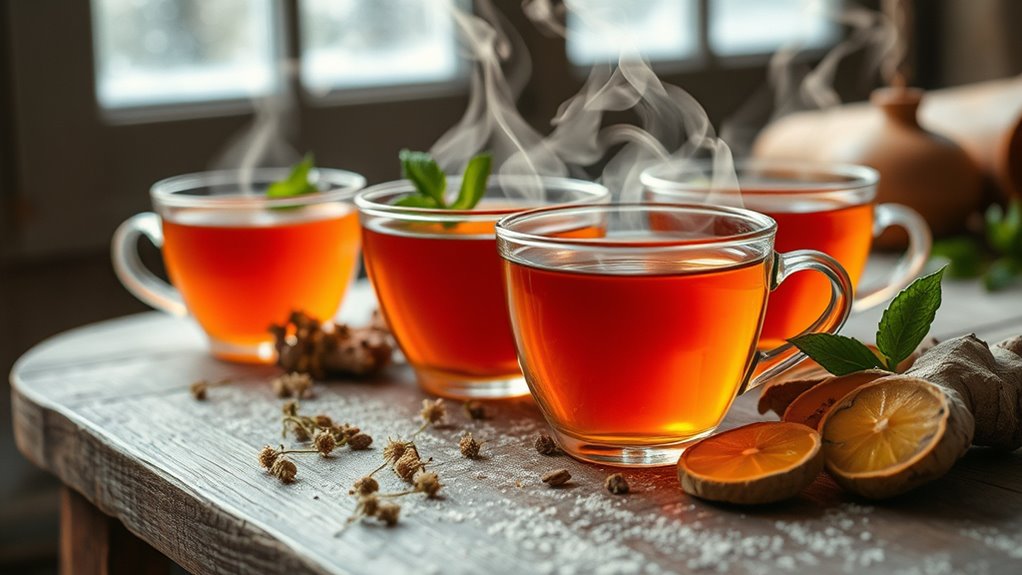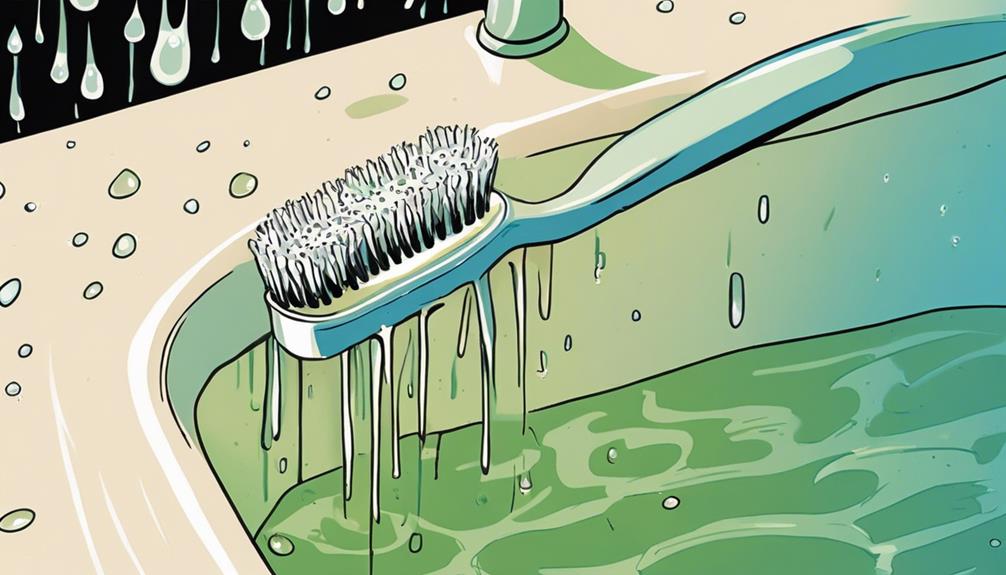To support your oral health during winter, try herbal teas like ginger and chamomile. Ginger tea offers anti-inflammatory and antimicrobial benefits that help reduce gum inflammation, fight bacteria, and boost saliva production, keeping your mouth fresh and protected. Chamomile soothes gums, heals ulcers, and shields tissues with natural antioxidants. Incorporating these teas into your daily routine can help maintain healthier, pain-free teeth and gums. Keep exploring to discover more natural ways to keep your mouth healthy all season long.
Key Takeaways
- Ginger tea’s anti-inflammatory and antimicrobial properties help reduce gum inflammation and bacterial growth during winter.
- Chamomile tea soothes gums, promotes healing, and protects oral tissues against oxidative stress in cold months.
- Regular consumption of herbal teas supports saliva production, aiding in natural cleansing and preventing dry mouth issues.
- Incorporating herbal teas into daily routines can enhance immune support and overall oral health in winter.
- Herbal teas serve as natural, gentle remedies that complement good oral hygiene practices to maintain fresh, healthy mouths during cold seasons.

Herbal teas have gained popularity as natural remedies for maintaining oral health. During winter, when your mouth is more vulnerable to dryness, soreness, and infections, sipping on the right herbal teas can make a noticeable difference. One such tea that stands out is ginger tea, celebrated for its numerous health benefits, including its impact on oral health. Ginger benefits extend beyond digestion; it has natural anti-inflammatory and antimicrobial properties that can help reduce gum inflammation and fight bacteria responsible for plaque buildup and bad breath. When you brew fresh ginger root into tea, you’re not only soothing your senses but also supporting your oral tissues in staying healthy and resilient during the colder months. Its warming nature can also stimulate saliva production, which is *essential* because increased saliva helps wash away food particles and neutralize acids that cause tooth decay. Supporting oral health through herbal teas is an accessible way to enhance your winter oral care routine with natural, beneficial ingredients.
Another excellent choice is chamomile tea, known for its gentle, soothing properties. Chamomile’s properties make it an ideal herbal remedy for soothing irritated gums and reducing oral inflammation. When you drink chamomile tea, you’re tapping into its natural anti-inflammatory and antimicrobial effects, which can help ease mouth sores, ulcers, and gum discomfort often worsened by winter’s dry air. The calming properties of chamomile do more than just relax your mind; they also promote healing by decreasing inflammation and fighting bacteria that contribute to periodontal disease. Plus, chamomile’s natural antioxidants help protect the tissues of your mouth from oxidative stress, which can accelerate aging and damage your oral tissues. Its mild flavor makes it pleasant to sip throughout the day, especially if you’re battling winter colds or sore throats, which can sometimes spread to your mouth.
Incorporating these herbal teas into your daily routine during winter is simple and effective. You can start your day with a warm ginger tea to boost your immune system and promote oral health, or enjoy a calming cup of chamomile before bed to help your gums recover overnight. Both teas are easy to prepare—just steep fresh ginger slices or dried chamomile flowers in hot water. Remember, consistency is *vital*; regular consumption can help maintain a healthier mouth and prevent winter-related oral issues. Combining these herbal teas with good oral hygiene habits, like brushing and flossing, can further enhance their benefits. By choosing teas with such beneficial properties, you’re taking a natural step toward keeping your mouth healthy, fresh, and pain-free throughout the winter months.
Frequently Asked Questions
Can Herbal Teas Replace Regular Dental Care in Winter?
Herbal tea alternatives can’t replace regular winter dental hygiene, but they can complement it. While sipping herbal teas with ingredients like chamomile or peppermint may support oral health, you still need to brush, floss, and visit your dentist regularly. Relying solely on herbal teas isn’t enough; they’re a helpful addition, not a substitute, for maintaining good dental care during winter.
Are There Any Herbal Teas to Avoid for Sensitive Teeth?
You might be surprised, but herbal teas with high acidity or strong flavors can trigger herbal tea sensitivities if you have sensitive teeth. Avoid teas with citrus, cinnamon, or peppermint, as these ingredients can irritate your enamel. When considering tea ingredient considerations, opt for milder, less acidic herbal blends like chamomile or ginger. Always listen to your body and consult your dentist if you notice increased sensitivity after drinking certain herbal teas.
How Often Should I Drink Herbal Tea for Oral Health Benefits?
You should aim for 1-2 cups of herbal tea daily to maximize oral health benefits without risking sensitivity. Your tea consumption should include a variety of herbal teas, like chamomile or green tea, which support oral health. Be mindful not to sip constantly, as prolonged exposure can harm your teeth. Balance your herbal tea variety to enjoy the benefits while protecting your dental health.
Do Herbal Teas Stain Teeth or Affect Dental Work?
Think of herbal teas as gentle rivers flowing near your teeth. While most herbal teas don’t stain teeth or harm dental work, some dark varieties can cause teeth staining over time, like a river leaving deposits. To protect your smile, enjoy herbal teas in moderation and rinse your mouth afterward. Remember, the effects of herbal tea on dental work are minimal, but consistent care keeps your smile shining brightly.
Can Herbal Teas Help With Winter Oral Infections or Sore Throats?
Yes, herbal teas can help with winter oral infections and sore throats. They offer herbal infusion benefits like soothing irritation and reducing inflammation. Drinking warm herbal infusions, such as chamomile or ginger, supports your winter immunity by keeping your mouth hydrated and fighting germs. Incorporate these teas into your routine to ease sore throats and strengthen oral health during cold months, keeping you comfortable and healthy.
Conclusion
As you sip on herbal teas this winter, remember they can be your trusty allies in maintaining oral health. Whether it’s soothing your gums or fighting bacteria, these natural remedies are worth embracing. Just like the wise old alchemist of yore relied on herbs, you can trust in their power. So, brew a cup, stay cozy, and keep your smile bright—because good oral health is timeless, even in this modern age of smartphones and selfies.








